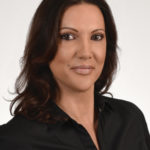
Houston’s Kelli Lines Breaks New Ground as a Transgender Real-Estate Agent
After her transition led to a divorce, the parent of four reinvented herself.
Three years ago, after Kelli Lines came out to her wife as a transgender woman, their marriage began to fall apart.
Lines, who had been a stay-at-home parent for 12 years, says her wife was supportive initially, but then decided to cut her off financially when they divorced.
“I had to reinvent myself on the fly,” says Lines. “I hadn’t worried about my finances in so long. After I lost my wife’s support, I had to figure out how to make a living again.”
Lines, who lived with her family in Spring, worked in accounting and natural-gas trading prior to taking time off to care for her daughter, Shannon, who’s now 13. She had no desire to re-enter those professions, so she went to work as a real-estate broker.
“I was always interested in real estate,” Lines says. “When my ex got to be more established in her career, one of our hobbies was to look at open houses. I became knowledgeable about the property markets in Spring, The Woodlands, and Galveston.”
Today, at 53, Lines is one of the few openly trans real-estate agents in the Houston area, and her status could represent a break-through for others who want to go into the field.

Jeff Berger is the founder and CEO of the National Association of Gay and Lesbian Real Estate Professionals (NAGLREP), a nonprofit that launched in 2007 to create a directory of LGBTQ real-estate agents. Berger said only five of the group’s 2,000 LGBTQ members are trans. Jamie Zapata, a real-estate agent at Coldwell Banker D’Ann Harper Realtors in San Antonio, is Texas’ only other trans member of NAGLREP.
Zapata, who began working in real estate about one year ago, says she chose her field in part to break down professional stereotypes.
“Trans women are typically known to work as beauty professionals, doing makeup, hair, and drag,” Zapata says.“There is nothing wrong with those professions, but society has confined many of us to them.”
Zapata admits that she has faced some difficulties as an openly trans real-estate agent, but says her positive experiences have outweighed the negative ones. For example, Zapata participated last year in Son Sus Niños También, a back-to-school event that encourages and empowers trans students.
“The best part about being a trans [agent] is knowing that I have inspired others,” Zapata says. “My position has brought awareness to my community. People now know that trans folks can have the same career opportunities as everyone else.”
Berger says the real-estate profession, which tends to be somewhat conservative, is “in need of more LGBTQ workers.”
He believes it is important for LGBTQ buyers and sellers to work with supportive brokers because housing discrimination against same-sex couples and trans people still exists.
The Fair Housing Act (Title VIII of the 1964 Civil Rights Act) prohibits discrimination in the sale, rental, financing, or other housing-related transactions based on race, color, national origin, religion, sex, family status, or disability. However, the law does not explicitly protect people against discrimination based on sexual orientation or gender identity.
Only 17 states have laws prohibiting housing discrimination against LGBTQ people, according to the Human Rights Campaign. Three other states prohibit housing discrimination based on sexual orientation, but not on gender identity. Thirty states, including Texas, have no LGBTQ protections in housing.
Lines, who is with NB Elite Realty, says she does not hide the fact that she is trans, but she is not out to all of her coworkers and clients because she does not believe her gender identity should be at the forefront of her work.
“My job is to close deals, and that’s how I approach real estate,” Lines says. “I don’t want to be known as ‘the transgender agent’; I want to be known as an agent who happens to be trans.”
Lines graduated from the University of Houston with a bachelor’s degree in accounting in the early ’80s. She worked for Enron until she was laid off when the company collapsed in 2001.
When her ex-wife gave birth to Shannon, Lines decided to stay home and care for their daughter. Lines said she struggled with her gender identity before and during the marriage.
“I wanted the freedom to fully explore my gender,” Lines says. “My wife knew I dressed in feminine clothing, and she was okay with it to a point, but then she started putting restrictions on it. If I wanted to present female, I had to go three towns over to protect her image.”
Lines received mixed reactions from other family members when she came out. Her mother fully supported her, but her father, who was absent most of her life, asked her to never contact him again.
Lines also has three sons from a previous marriage. When she came out, one of them told her that he did not want to see her again, while the other two were supportive.
Lines says her daughter, Shannon, knew that she was questioning her gender identity long before anyone else. When she was 8, Shannon began to notice that Lines kept feminine wigs in her office.
“I couldn’t keep my daughter out of what was going on with me visually,” Lines says. “One day I was doing computer work in my office and she asked if she could comb one of my wigs. I told her, ‘Sometimes I wear those,’ and she responded with, ‘Oh, that’s cool.’”
“Shannon has been the most supportive person in my life,” Lines adds. “When you let somebody into your world, it makes you closer.”
Lines now lives in the Heights and attends a weekly support group for trans women. She says that transitioning helped her recognize the privilege that she has. The unemployment rate among trans folks is three times higher than the nation’s official unemployment rate, with trans people of color experiencing even higher rates of unemployment.
“I have been blessed to have access to opportunities that not all trans people have,” Lines says. “Once I get back on my feet, I plan on giving back to the trans community.”
This article appears in the October 2018 edition of OutSmart magazine.










